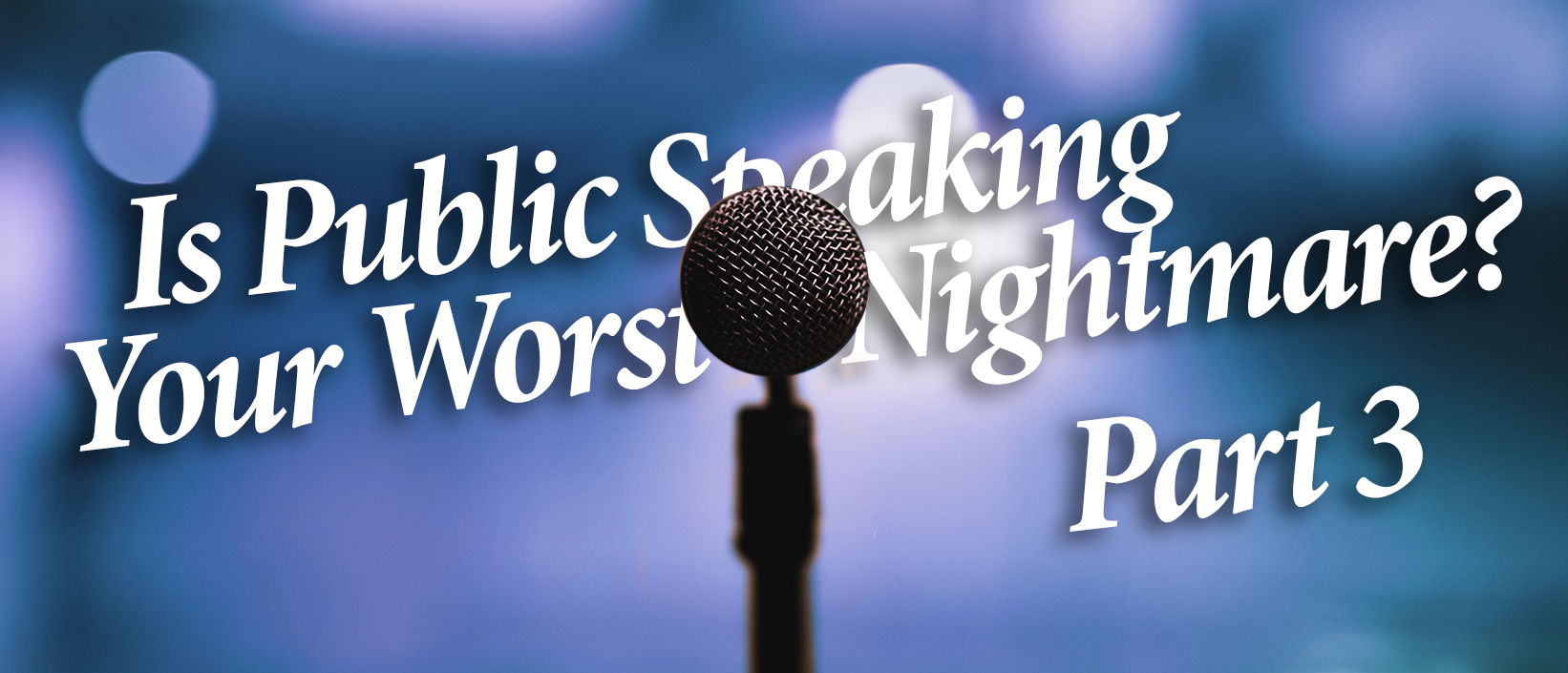Blog
Is public speaking your worst nightmare? Part 3
By Amy Bennett | March 19, 2018

Be honest. Who knows what the word glossophobia means? Not me. I had to look it up. It means the fear of public speaking. People fear public speaking so much that they created a word for it! The word glossophobia derives from the Greek word γλῶσσα glōssa, meaning tongue, and φόβος phobos, fear or dread. Some people have this specific phobia; others may also have broader social phobia or social anxiety disorder.
While in some, this fear is more intense than in others, different sources I’ve seen say that up to 75% of us have glossophobia. I read a funny quote from Jerry Seinfeld about this fear:
“According to most studies, people’s number one fear is public speaking. Number two is death. Death is number two! Does that sound right? That means to the average person, if you go to a funeral, you’re better off in the casket than doing the eulogy.”
Okay. That may be an exaggeration, but no doubt, the fear is very real. If you truly do want to overcome your fear of public speaking, here are some suggestions:
- Be patient with yourself. Start small. Talk more in meetings. Get used to hearing your voice.
- Confront your fears. Steve Jobs was thought of as a great public speaker and storyteller; however, he wasn’t always that way. Jobs became very, very nervous before and during speeches early on: you can even see him visibly shaking.
- Learn from the best. Watch videos of those who are considered to be great orators, but realize that nerves are normal. Google Winston Churchill: he was one of the best, but read about everything he had to overcome as a child. You’ll also want to read about his speech before the House of Commons when he was 29 years of age. It will make you feel better—much better!
- Join a group like Toastmasters. In order to get better, you’ve got to feel more comfortable, so you need to practice, right?
- Preparation and practice are key. Watch yourself in the mirror. I know it’s hard for most of us to do that, especially if you’re an introvert, but eventually, you will feel more relaxed.
- As we talked about in part one, whenever you can, choose a topic that you’re excited and informed about. That way, if you go off track, you can just speak from the heart.
- Be yourself. Some articles suggest that improvisation is a bad thing. Mark Twain once said, “It takes me more than three weeks to prepare for a good impromptu speech.” I’m not so sure. Memorization can appear mechanical, so finding a comfortable balance is important.
- Enter into this with positivity. Don’t over-analyze the situation or dwell on past public speaking attempts.
- Fake it! Inside you may be dying, but use your adrenaline (aka, nervous energy) as a positive attribute. Your audience may view that as passion or excitement.
These are just my “real-world” tips. To learn from a pro, you may even want to enroll in a college course. Email me. I just happen to know an excellent Catholic university in Indianapolis which offers some great online communication courses.
© 2021 Marian University
Notice of Nondiscrimination
Marian University does not discriminate on the basis of race, ethnicity, color, sex, gender, gender identity, sexual orientation, religion, creed, national origin, age or disabilities in the selection
of administrative personnel, faculty and staff, and students.
*Placement rates are gathered from data collected from graduates within six months of graduation.
Students may make a complaint to the Indiana Commission of Higher Education.
Marian University is sponsored by the Sisters of St. Francis, Oldenburg, Indiana.
Submit a Marketing Request
Website built with